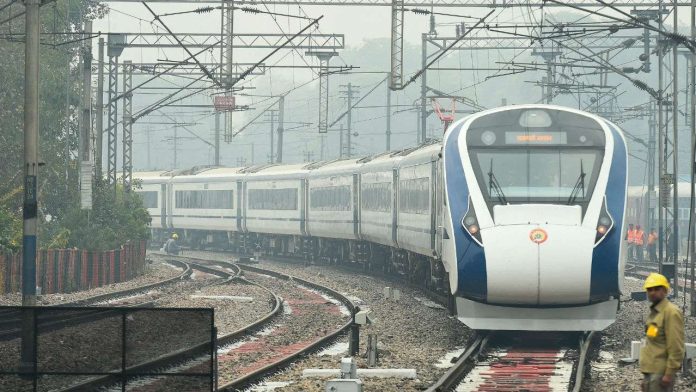Tata Group will roll out its ‘First in India’ seating system for Vande Bharat Express trains from September 2022 and is planning to spend Rs 3,000 crore on research and development by 2026.
The steel-to-salt conglomerate is also targeting to be among the top 5 technology firms in the steel industry globally by 2030.
Tata Steel’s Composites division bagged a Rs 145 crore bulk order for seating systems of the Vande Bharat express that includes the supply of complete seating systems for 22 train sets, with 16 coaches in each train set.
“These are specially designed seats, which can rotate 180 degrees and have aircraft-style passenger amenities. This is ‘first-in-India’ kind of a supply, which will be executed over 12 months starting September 2022,” Debashish Bhattacharjee, Vice President, Technology & New Materials Business, Tata Steel, told PTI.
“Composites industry in India is dominated by institutional businesses and is largely dependent on infrastructure, industrial and railway sectors. One of the key initiatives of the composites business was to convert to Fibre Reinforced Polymer (FRP) applications where steel is currently being used. Railways has been a promising customer for the FRP Composites business of Tata Steel.”
The FRP used in the seats will have higher corrosion resistance and lower maintenance cost. Moreover, it will be conforming to the European standard of fire-retardant property, and will offer improved safety and comfort to passengers.
Vande Bharat Express, also known as Train 18, is the second fastest train in India, which operates at a speed of 130 km/hr.
The company is targeting to be among the ‘Top 5 in technology in steel industry globally by 2030’ and one of the key enablers for achieving technology leadership is a quick conversion of ideas into pilot testing and commercialisation, the company officials said.
“This requires adequate infrastructure and pilot scale facilities to test the hypothesis developed during lab-scale experiments. Expenditure plan for Tata Steel India research & development (R&D) for the next 5 years (FY22-26) is Rs 3,000 crore,” the top official said.
Bhattacharjee said Tata Steel is setting up a greenfield facility to produce Sandwich panels.
“Tata Steel is setting up a greenfield facility at Khopoli, Maharashtra, in collaboration with a technology partner from the Netherlands.
“The facility will manufacture Aluminium honeycomb cored sandwich panels, which will be used mainly for interiors of rail and metro coaches. Key customers for the unit will be global metro and rail coach OEMs and also Indian Railways,” he noted.
New Materials Business was set up with the vision to explore opportunities in materials beyond steel. FY2021-22 saw the completion of NMB’s fourth year of operations, and currently, the business has three material verticals – Composites, Graphene, and Medical Materials and Devices.
Tata Steel’s composites business focuses on three market segments: industrial, infrastructure and railways.
For railways, the composites business of NMB has been leveraging Tata Group synergies by offering integrated solutions jointly with TM Automotive Seating Systems and Tata Autocomp Systems.
In a major step towards fulfiling the promise made by Prime Minister Narendra Modi on 15 August last year of running 75 Vande Bharat trains in 75 weeks, the third such train will leave the Integral Coach Factory (ICF) in Chennai on 12 August for trials, sources said on Tuesday (26 July).
The train is likely to be run on a specific route in south India from November this year, the sources added. Interestingly, a report in News18 says Telangana may get India’s next Vande Bharat train.
The trial of the train will be conducted from Kota in Rajasthan to Nagda section of Madhya Pradesh. The trial speed of the train will be 100 to 180 kmph. After the success of two-three trials, the new Vande Bharat train will be fit to run commercially.


